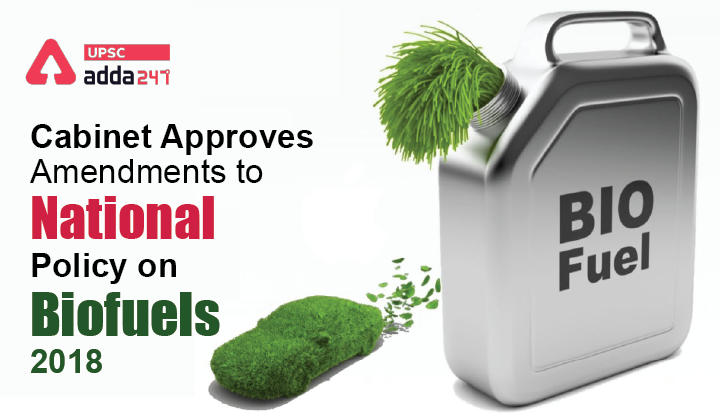Table of Contents
National Policy on Biofuels UPSC: Relevance
- GS 2: Government policies and interventions for development in various sectors and issues arising out of their design and implementation.
National Policy on Biofuels 2018: Context
- Recently, the cabinet has approved the Amendments to the National Policy on Biofuels -2018, to increase biofuel production and reduce the dependence on imports of petroleum products.
कैबिनेट ने जैव ईंधन पर राष्ट्रीय नीति 2018 में संशोधन को स्वीकृति दी
National Policy on Biofuels: Major amendments
- to allow more feedstocks for production of biofuels,
- to advance the ethanol blending target of 20% blending of ethanol in petrol to ESY 2025-26 from 2030.
- to promote the production of biofuels in the country, under the Make in India program, by units located in Special Economic Zones (SEZ)/ Export Oriented Units (EoUs),
- to add new members to the NBCC (National Biofuel Coordination Committee).
- to grant permission for export of biofuels in specific cases, and
- to delete/amend certain phrases in the Policy in line with decisions taken during the meetings of National Biofuel Coordination Committee.
National Policy on Biofuels 2018: Expected benefits
- The amendments will attract and foster developments of indigenous technologies which will pave the way for Make in India drive and thereby generate more employment.
- The amendment proposal will pave the way for Make in India drive thereby leading to reduction in import of petroleum products by generation of more and more biofuels.
- Since many more feedstocks are being allowed for production of biofuels, this will promote the Atmanirbhar Bharat and give an impetus to the vision of India becoming ‘energy independent’ by 2047.
Also Read: Mission Integrated Biorefineries
What is National Policy on Biofuels 2018?
- The National Policy on Biofuels – 2018 builds on the achievements of the earlier National Policy on Biofuels and sets the new agenda consistent with the redefined role of emerging developments in the Renewable Sector.
Features of National Policy on Biofuels 2018
- The Policy categorises biofuels as “Basic Biofuels” viz. First Generation (1G) bioethanol & biodiesel and “Advanced Biofuels” – Second Generation (2G) ethanol, Municipal Solid Waste (MSW) to drop-in fuels, Third Generation (3G) biofuels, bio-CNG etc. to enable extension of appropriate financial and fiscal incentives under each category.
- The Policy expands the scope of raw material for ethanol production by allowing use of Sugarcane Juice, Sugar containing materials like Sugar Beet, Sweet Sorghum, Starch containing materials like Corn, Cassava, Damaged food grains like wheat, broken rice, Rotten Potatoes, unfit for human consumption for ethanol production.
- Farmers are at a risk of not getting appropriate price for their produce during the surplus production phase. Taking this into account, the Policy allows use of surplus food grains for production of ethanol for blending with petrol with the approval of National Biofuel Coordination Committee.
- With a thrust on Advanced Biofuels, the Policy indicates a viability gap funding scheme for 2G ethanol Bio refineries of Rs.5000 crore in 6 years in addition to additional tax incentives, higher purchase price as compared to 1G biofuels.
- The Policy encourages setting up of supply chain mechanisms for biodiesel production from non-edible oilseeds, Used Cooking Oil, short gestation crops.
Expected benefits of National Policy on Biofuels 2018
- Reduce Import Dependency: The ethanol supply year 2017-18 is likely to see a supply of around 150 crore litres of ethanol which will result in savings of over Rs.4000 crore of forex.
- Cleaner Environment: By reducing crop burning & conversion of agricultural residues/wastes to biofuels there will be further reduction in Green House Gas emissions.
- Health benefits: Prolonged reuse of Cooking Oil for preparing food, particularly in deep-frying is a potential health hazard and can lead to many diseases. Used Cooking Oil is a potential feedstock for biodiesel and its use for making biodiesel will prevent diversion of used cooking oil in the food industry.
- MSW Management: There are technologies available which can convert waste/plastic, MSW to drop in fuels. One ton of such waste has the potential to provide around 20% of drop in fuels.
- Infrastructural Investment in Rural Areas: At present Oil Marketing Companies are in the process of setting up twelve 2G bio refineries with an investment of around Rs.10,000 crore. Further addition of 2G bio refineries across the Country will spur infrastructural investment in the rural areas.
- Employment Generation: One 100klpd 2G bio refinery can contribute 1200 jobs in Plant Operations, Village Level Entrepreneurs and Supply Chain Management.
- Additional Income to Farmers: By adopting 2G technologies, agricultural residues/waste which otherwise are burnt by the farmers can be converted to ethanol and can fetch a price for these wastes if a market is developed for the same. Also, farmers are at a risk of not getting appropriate price for their produce during the surplus production phase. Thus, conversion of surplus grains and agricultural biomass can help in price stabilization.
Read current affairs for UPSC





 TSPSC Group 1 Question Paper 2024, Downl...
TSPSC Group 1 Question Paper 2024, Downl...
 TSPSC Group 1 Answer key 2024 Out, Downl...
TSPSC Group 1 Answer key 2024 Out, Downl...
 UPSC Prelims 2024 Question Paper, Downlo...
UPSC Prelims 2024 Question Paper, Downlo...




